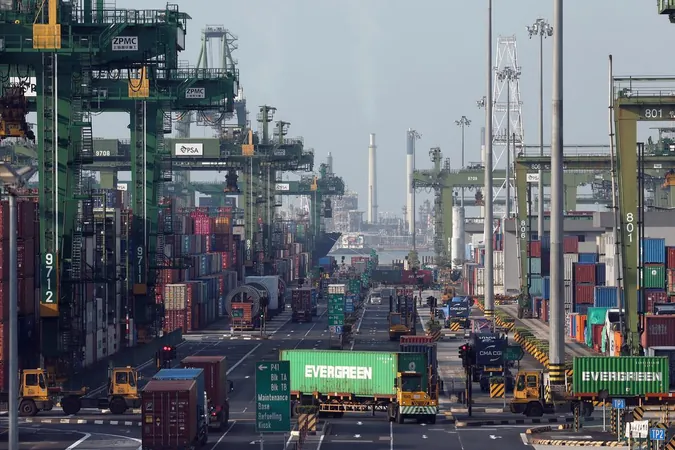
How Singapore Can Navigate Trump’s Tariff Storm: Strategies and Opportunities
2025-04-07
Author: Nur
The Case for Exemption
Experts contend that Singapore has grounds to request an exemption from these tariffs, highlighting its historical status as the US's oldest FTA partner in Asia. The imposition of these tariffs, according to analysts, disrupts the very tenets of their established trade agreement that promotes zero tariffs between the two nations.
The trade landscape is already skewed heavily in favor of Singapore compared to other countries facing steeper tariffs—such as China over 54% and Vietnam at 46%. This edge keeps Singaporean exports, including electronics, pharmaceuticals, and chemicals, more competitively priced in the US market, enhancing its attractiveness as an investment destination amidst global trade uncertainties.
A Strategic Response
Prime Minister Lawrence Wong is set to address the implications of US tariffs in Parliament on April 8, signaling high-level engagement on this critical issue. Veteran trade analysts warn that negotiations will be tough; however, there may be potential for fruitful discussions given the absence of significant trade barriers between the US and Singapore.
William Reinsch of the Centre for Strategic and International Studies emphasizes that the FTA should ensure fair treatment, arguing that Singapore's zero tariffs on US products—subject to rules of origin—should be consistently upheld despite the new tariffs. This expectation is central to reinforcing the mutual benefits both nations have historically enjoyed through their trade agreements.
The Regional Impact
As the global trade environment remains charged, Singapore could emerge as a vital logistics and manufacturing hub within Southeast Asia. The 10% tariff could potentially act as a magnet for multinational corporations reevaluating their production bases in higher-tariff countries like China and Vietnam. With a robust infrastructure and stable business climate, Singapore stands to attract companies looking for new footholds in the region.
Moreover, if multinational companies seek alternative markets due to rising trade costs elsewhere, Singapore’s competitive tariff rate positions it as an appealing relocation target. Simultaneously, Singapore has the potential to strengthen its role as a regional gateway for Asean's exports to the US, which could stimulate increased trade volumes.
Future Developments
Looking ahead, the Trump administration has hinted at additional sector-specific tariffs targeting key Singaporean exports, such as semiconductors and pharmaceuticals. This unpredictability keeps Singapore on its toes, yet it may also pave the way for enhanced discussions around tariff negotiations.
Trade experts suggest that Singapore must proactively engage with US officials—perhaps by having high-ranking government representatives meet with US Commerce officials—to facilitate dialogue on these complex issues. In doing so, they could alleviate tensions and seek favorable outcomes for both nations.
As the narrative around tariffs and trade continues to evolve, one thing remains clear: Singapore, equipped with its strategic trade position and resilient economic framework, is poised to navigate the challenges and discover new opportunities in an ever-changing global marketplace. Will Singapore rise to become an even stronger trade hub in the wake of these tariffs? Only time will tell.



 Brasil (PT)
Brasil (PT)
 Canada (EN)
Canada (EN)
 Chile (ES)
Chile (ES)
 Česko (CS)
Česko (CS)
 대한민국 (KO)
대한민국 (KO)
 España (ES)
España (ES)
 France (FR)
France (FR)
 Hong Kong (EN)
Hong Kong (EN)
 Italia (IT)
Italia (IT)
 日本 (JA)
日本 (JA)
 Magyarország (HU)
Magyarország (HU)
 Norge (NO)
Norge (NO)
 Polska (PL)
Polska (PL)
 Schweiz (DE)
Schweiz (DE)
 Singapore (EN)
Singapore (EN)
 Sverige (SV)
Sverige (SV)
 Suomi (FI)
Suomi (FI)
 Türkiye (TR)
Türkiye (TR)
 الإمارات العربية المتحدة (AR)
الإمارات العربية المتحدة (AR)